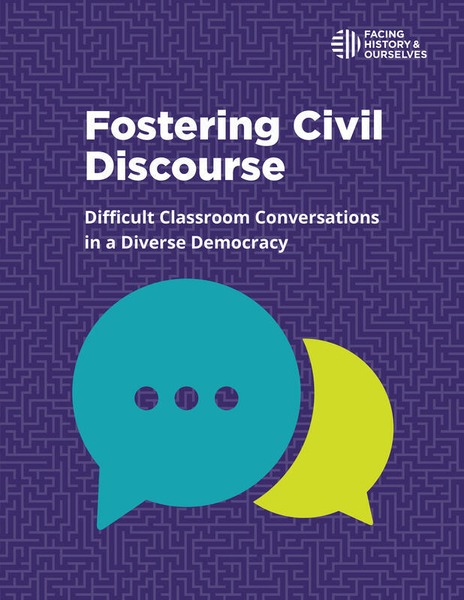Facilitating Conversations in Classrooms During Divided Times
Facing History and Ourselves is an organization that has for nearly 50 years (in the United States and 16 years here in Canada) understood that classrooms are places where students must have opportunities to build and practice the skills necessary to be active participants in democratic societies. Facing History’s teacher resource, Fostering Civil Discourse: Difficult Classroom Conversations in a Diverse Democracy begins by explaining that,
“Research shows that discussing contemporary issues in the classroom increases students’ engagement, improves their communication and critical thinking skills, and increases their participation in civic life as adults. Yet classroom conversations that touch on emotional topics or spark controversy between students can be difficult to navigate.”
Engaging in dialogue across difference has become increasingly more difficult as our society becomes more divided, and as we curate our lives to exist in echo chambers that reinforce our own strongly held positions. Students observe examples of people who choose to yell, debate, argue, put down, or even dehumanize those who hold different opinions. Rarely do students see models of people who listen, and who are open to learning from individuals who hold different positions. While it is not easy, particularly in this moment, classrooms must be places where students can practice the skills necessary to listen with openness to people who have different lived experiences, and hold different perspectives. While also learning to share their own viewpoints and opinions in ways that create opportunities to build relationships and connections.

As educators navigate the challenges of creating classrooms in which there is an open invitation to dialogue and conversation, we hope the following resources will be helpful.
Fostering Civil Discourse: Difficult Classroom Conversations in a Diverse Democracy walks educators through action steps (with reflection prompts and strategies) for creating classrooms where challenging conversations are possible. These action steps begin with personal reflection for educators on their own positions and context. It then provides teachers with strategies for building classroom communities where dialogue is possible. Finally, the resource provides strategies for planned classroom discussions, as well as for the unplanned moments when controversial or divisive topics are brought into the classroom.
Diane Goodman’s Straight A’s for Facilitating Crucial Conversations is a protocol that assists educators in moments when there is a need to address bias, stereotype, or misinformation. It can be helpful when a student says something that requires correction, and can be used to clarify intent and to kindly “call someone in”.
Current Events Toolkit Classrooms should be places where students and teachers can discuss current events, and yet these are often the very moments where different perspectives about what is happening in the world heightens division and can lead to the breakdown of discourse. This toolkit provides helpful strategies for discussing current events in the classroom.
Facing History is working on a new framework for dialogue that we hope will provide additional support for educators who are interested in supporting students engage in meaningful dialogue across difference. This framework, called The Quad of DIalogue, seeks to build connections between people. Through practicing humility, curiosity, empathy, and understanding (the four corners of the Quad of Dialogue) learning and growth through conversations becomes possible.
To make sure that you are notified when this protocol is released, register at Facing History & Ourselves.
Please note, resources are only available in English at this time.
